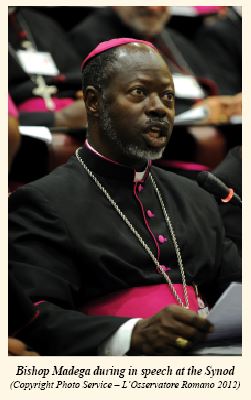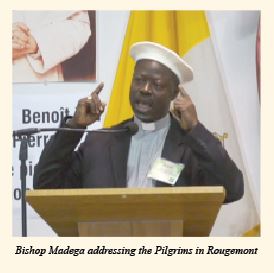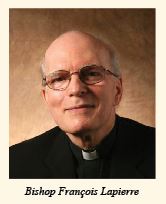Speech of Bishop Mathieu Madega Lebouakehan of Gabon at the Synod of Bishops in Rome for the New Evangelization
“Social Credit: a financial system exempt from debts at the service of man. This structure, inspired by the Holy Spirit, will help the Church and all of humanity.”
 At every week of study that we organize at our headquarters in Rougemont, Canada, on economic democracy (or social credit) viewed in the lightof the social doctrine of the Church, all the attendant students — bishops, priests and lay faithful — are filled with enthusiasm and return full of fire in their countries to make known what they just discovered with the Pilgrims of St. Michael.
At every week of study that we organize at our headquarters in Rougemont, Canada, on economic democracy (or social credit) viewed in the lightof the social doctrine of the Church, all the attendant students — bishops, priests and lay faithful — are filled with enthusiasm and return full of fire in their countries to make known what they just discovered with the Pilgrims of St. Michael.
However, we have rarely seen a Bishop as enthusiastic as the Most Rev Mathieu Madega Lebouakehan, Bishop of Port Gentil in Gabon, who attended our most recent week of study last August, who proudly wore the white beret, spoke with unusual eloquence and vigour at our Congress (see the previous issue of MICHAEL), going as far as to say that the whole world will become in favor of Social Credit! He had promised us that after his departure from Rougemont, that his fervour would not fade. He even said that he would talk about us at the Synod in Rome for the New Evangelization in October, since he was one of the Bishops invited at the Synod. (Over 250 Bishops from all over the world had been invited, each one being allowed to speak for five minutes.)
Well, Bishop Mathieu did us disappoint us, far from it! He kept indeed his promise, and made a fantastic speech at the Synod of Bishops in Rome, on October 17. He spoke in Italian, and mentioned the Pilgrims of St. Michael, the Louis Even Institute and Social Credit, “a debt-free financial system at the service of man. This structure, inspired by the Holy Spirit will help the Church and all of humanity.” Moreover, Bishop Mathieu has plenty of projects in mind to make us known in Africa and any place it could bear fruit. Here is the full text of his speech at the Synod:
In No.51 of the Instrumentum Laboris (instrument of work), we find what we call the five sectors: – 1. The cultures sector; – 2. The society sector; –3. The economics sector; – 4. The civic life sector; – 5. The religion sector. An unhappy crowd, faced with these sectors, that must choose one of them, would first enter into the economic sector in order to meet its basic needs, according to the famous: primum vivere deinde philosophari (live first, philosophize later) and we can add mutatis mutandis add primum vivere deinde evangelizzari. (Having made the necessary changes, first live, then evangelize.)
 Evangelization – which has as its target the making of saints, sanctifying the Name of God the Father, building his Kingdom, doing His will (cf. Pater Noster) – is often hindered by basic needs which we call economy or bread. It is noted from original sin (Gn 3:1-24) to the first seven deacons (Ac 6:1), without forgetting other places of present and past history: the economy is present in all human activities.
Evangelization – which has as its target the making of saints, sanctifying the Name of God the Father, building his Kingdom, doing His will (cf. Pater Noster) – is often hindered by basic needs which we call economy or bread. It is noted from original sin (Gn 3:1-24) to the first seven deacons (Ac 6:1), without forgetting other places of present and past history: the economy is present in all human activities.
For us, the present economic crisis is therefore for the Church a kairos of the new evangelization. We therefore propose – such as the Pontifical Academy for the political or diplomatic sector – the creation of a new structure for the economic or finance sector. A structure based on ecclesial experience: monasticism, religious communities, prelatures, ecclesial movements, Focolari with the economy of communion, the Pilgrims of St. Michael and the Louis Even Institute with Social Credit: a financial system exempt from debts at the service of man. This structure, inspired by the Holy Spirit will help the Church and all of humanity. “Give me neither poverty nor riches, grant me only my share of food, for fear that, surrounded by plenty, I should fall away and say, ‘Yahweh - who is Yahweh?’ or else, in destitution, take to stealing and profane the name of my God” (Pr 30:8b-9).
“The intimate bond between New Evangelization and the social doctrine of the Church”
Speech of Bishop François Lapierre of Saint-Hyacinthe
Four Bishops represented Canada at the Synod: Most Rev. John Corriveau, O.F.M. Cap., Bishop of Nelson, British Columbia; Most Rev. Brian Dunn, Bishop of Antigonish, Nova Scotia; Most Rev. Gerald Cyprien Lacroix, Archbishop of Quebec City; and Most Rev. François Lapierre, Bishop of Saint-Hyacinthe, Quebec – the diocese that includes Rougemont and the headquarters of the Pilgrims of St. Michael.
On Saturday, October 13, 2012, Bishop Lapierre made a speech about the importance of the social doctrine of the Church within the context of the New Evangelization:
 Number 130 of the Intrumentum laboris states that “The Church’s social doctrine proclaims and bears witness to faith. It is an instrument and an indispensable setting for formation in faith”.
Number 130 of the Intrumentum laboris states that “The Church’s social doctrine proclaims and bears witness to faith. It is an instrument and an indispensable setting for formation in faith”.
The Instrumentum laboris is at the same time very rich but rather weak in its treatment of the relation between New Evangelization and the social doctrine of the Church. The intimate bond that exists between the annunciation of the Gospel and the service of justice and peace does not seem to be sufficiently developed to me.
This situation risks making New Evangelization appear to be more of an answer to internal problems of the Church and not enough as a unique contribution to the development of justice and peace in the world.
Today’s financial crisis makes us discover how avarice and cupidity have broken the bonds of meaning by separating the economy from its social dimension in human life.
These ties can only be found again by love, fraternity and friendship, which must be expressed not only in interpersonal relationships, but also in financial and commercial life as pointed out so well in the letter by Pope Benedict XVI Caritas in Veritate.
In this context, it is very important for the Church to be seen as a fraternity, a body, the Body of Christ. The community is already a proclamation of the Gospel of God.
In Christian initiation, we often separate love from justice, the path of faith from the social and political realities. Developing a culture of solidarity is an urgent need.
The great missionaries, throughout the centuries, hnew how to join the audacious proclamation of the Gospel of Christ and involvement among the poorest. Their actions have often spoken louder than their words.
Comments (1)
Molly
reply